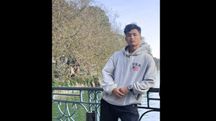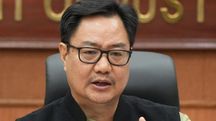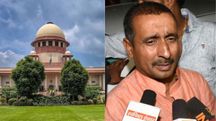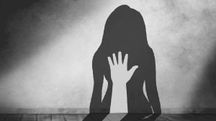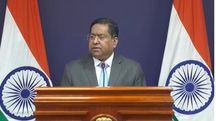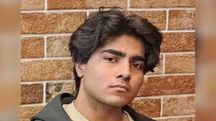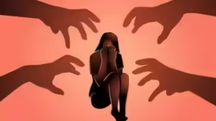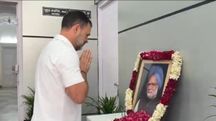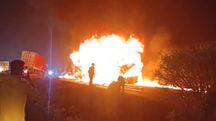"BBC" documentary on PM Modi sparks controversy; Centre orders blocking of tweets, videos related to series
In the first episode of the series, BBC investigates Modi’s rise through the ranks of the leading right-wing Bharatiya Janata Party (BJP), leading up to his appointment as the Chief Minister of the state of Gujarat in 2001.
 "BBC" documentary on PM Modi sparks controversy
"BBC" documentary on PM Modi sparks controversyA new BBC series called “India: The Modi Question” that puts under scrutiny Prime Minister Narendra Modi’s approach towards India’s Muslim population has fuelled controversy, sparking backlash eminent citizens, including Retired Judges, Retired Bureaucrats including Ambassadors and Retired Armed forces officers.
The first episode of the two-part series aired on January 17, and the second part is due to be broadcast next week on January 24.
“Narendra Modi’s premiership has been dogged by persistent allegations about the attitude of his Government towards India’s Muslim population. This series investigates these allegations and examines Modi’s backstory, as well as other questions about his politics when it comes to India’s largest religious minority,” BBC said.
In the first episode of the series, BBC investigates Modi’s rise through the ranks of the leading right-wing Bharatiya Janata Party (BJP), leading up to his appointment as the Chief Minister of the state of Gujarat in 2001. That’s where the controversy starts.
Modi’s term in Gujarat was tarnished by the 2002 Gujarat riots which were triggered when a train carrying Hindu pilgrims was burnt, with 59 people reported dead and the blame cast on Muslims.
“The episode examines in detail accusations that Mr Modi failed to take sufficient action to ensure the protection of Muslims during the riots and discovers new evidence provided to western diplomats who criticised his conduct and uncovers first-hand testimonies,” BBC said.
“All allegations have been denied by the Indian PM and subsequent judicial enquiries have failed to find conclusive evidence of serious misconduct,” it added.
The series, which holds Hindu nationalist Modi responsible for facilitating the anti-Muslim massacres, has drawn criticism over an alleged "anti-India bias."
Narendra Modi has served as India’s prime minister since 2014, and is currently serving his second term after his reelection in 2019.
In his political career, which spans over two decades, he has drawn persistent criticism for allegedly fuelling anti-Muslim sentiment and disregarding minority rights.
Elections are set to take place in India next year. According to Kothari, another purpose of the BBC series is “to influence pockets of urban population in India in relation to the upcoming 2024 elections.”
The series was the centre of fierce criticism and discussions on Social media as well.India's Foreign Ministry also criticized a documentary about the prime minister Narendra Modi broadcast by the BBC.
“The prejudice, the lack of objectivity and the persistent colonial mentality are blatantly visible,” the ministry spokesman said, Arindam Bagchi.
“If anything, this film or documentary is a reflection on the institution and people who are once again peddling this narrative. It makes us wonder about the purpose of this practice and the agenda behind it. Frankly, we do not wish to dignify such efforts,” the spokesman added.
The British public broadcaster's documentary is titled “India: The Modi Question”. The first episode was broadcast on January 17 and the second is scheduled for the 24th.
“Narendra Modi is the leader of the world's largest democracy, a man who was twice elected as prime minister of India and is widely regarded as the most powerful politician of his generation. Seen by the West as an important bulwark against Chinese domination of Asia, he is courted as a key ally by both the United States and the United Kingdom. Yet Narendra Modi's premiership has been dogged by constant accusations about his government's attitude towards India's Muslim population,” explains the “BBC” in its synopsis.
The documentary investigates the reliability of these allegations and, more generally, examines the Modi government's policies towards the country's largest religious minority.
The first episode traces Modi's political history from the first steps: his training in the National Voluntary Organization (RSS), a right-wing, Hindu nationalist paramilitary organization; his rise in the Indian People's Party (BJP) and the government as chief minister of the state of Gujarat, "where his response to a series of riots in 2002 remains a source of controversy".
In 2002, in fact, the arson of a train with the death of 59 Hindu pilgrims unleashed three days of riots, followed by months of violence against Muslims: according to official data, 1.044 people died, of which 790 belonged to the Islamic community. The role of the state administration in those events is the subject of discussion, although from a judicial point of view there have been no convictions.
The next episode, however, is dedicated to some "controversial policies" of Modi's second term at the helm of the central government, after his victory in the 2019 elections. The revocation of the special status in Jammu and Kashmir, with an Islamic majority, is documented and its downgrading from state to union territory. Furthermore, there is talk of the reform of the law on citizenship, the subject of disputes for the explicit reference to six religious confessions, with the exclusion of Islam: in fact, a faster process is expected for Hindus, Jains, Christians, Sikhs, Buddhists and Parsi who escaped religious persecution in Bangladesh, Pakistan and Afghanistan.
Modi and his government, recalls the "BBC", reject any accusation of discrimination. These and other measures, however, have been criticized by human rights organizations such as Amnesty International, which also claims it has been unjustly frozen for alleged financial irregularities.
Meanwhile, The Centre has ordered social media channels Twitter and YouTube to take down links of a BBC documentary titled "India: The Modi Question" on the 2002 Gujarat riots and Prime Minister Narendra Modi.
Earlier, Trinamool Congress (TMC) MP Derek O'Brien claimed that Twitter removed his tweet on the BBC documentary whch he claimed "exposed" Prime Minister Narendra Modi's "hate" towards minorities.
Several tweets and YouTube videos of the documentary titled no longer appear on the microblogging and video-sharing websites.
Copyright©2025 Living Media India Limited. For reprint rights: Syndications Today
